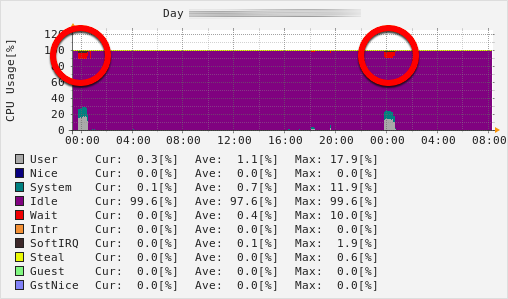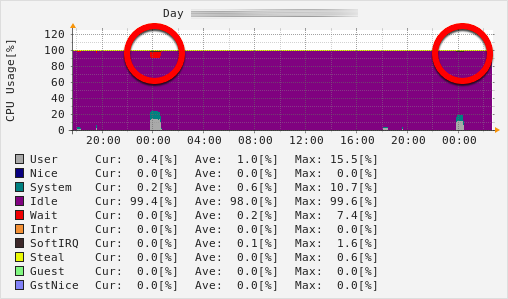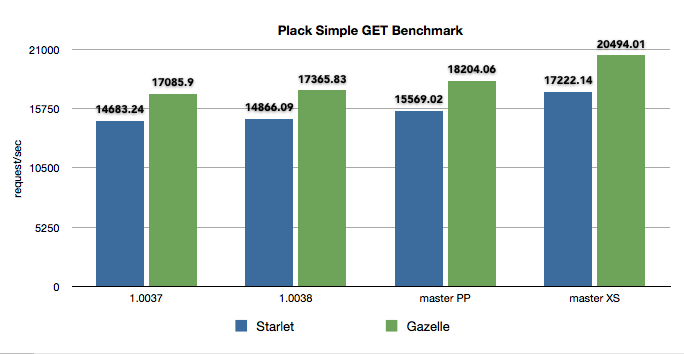GCP HTTP(S) load balancing 配下のnginxでクライアントIPを取得する方法
GCP HTTP(S) load balancing の X-Forwarded-For ヘッダは少し変わっているのでメモ。
X-Forwarded-For とクライアントIP
ELBや他のproxyを使って、その配下のサーバにリクエスト元のIPアドレスを伝える際には、X-Forwarded-For ヘッダが使われます。
X-Forwarded-For: $remote_addr
リクエストにすでにX-F-Fヘッダがあった場合は、後ろに追加します。
X-Forwarded-For: $http_x_forwarded_for, $remote_addr
となります。
X-F-Fを受け取ったサーバでは、アクセス元のIPが信用できるIPアドレスまたはIP帯域の場合に、X-F-Fの最後のIPアドレスを、remote_addrとして利用します。
nginxでは ngx_http_realip_module を使います。
set_real_ip_from 192.168.1.0/24; real_ip_header X-Forwarded-For;
アクセス元が 192.168.1.0/24 の場合、X-F-Fの最後のIPを利用するという意味です。
GCP HTTP(S) load balancing の X-F-F
本題のGCP HTTP(S) load balancingの場合、X-F-Fは
X-Forwarded-For: 1.2.3.4, 35.186.x.x
となります。この場合、1.2.3.4 が実際のclientのIPアドレス、35.186.x.xがロードバランサーに割り当てたIPアドレスです。また、アクセス元のIPアドレスは、以下の帯域(2017/2/21現在)となります。
130.211.0.0/22 35.191.0.0/16
この状態で、
まず
set_real_ip_from 130.211.0.0/22; set_real_ip_from 35.191.0.0/16; real_ip_header X-Forwarded-For;
という設定をいれると、nginxはアクセス元を信用してX-F-Fの最後の一つをクライアントIPだとします。この場合は 35.186.x.x になってしまい、クライアントIPではありません。
さらに設定が必要になります。
set_real_ip_from 130.211.0.0/22; set_real_ip_from 35.191.0.0/16; set_real_ip_from 35.186.x.x; real_ip_header X-Forwarded-For; real_ip_recursive on;
set_real_ip_from 35.186.x.x と real_ip_recursive を追加しました。real_ip_recursiveを有効にすると信用できるIPである限り再帰的にX-F-Fをたどっていきます。set_real_ip_fromにロードバランサーのIPを追加することで、35.186.x.xを信用し、次のIPアドレスをクライアントのIPとして採用ができるようになります。
この設定でようやく$remote_addrが1.2.3.4となりました。
まとめ
IPアドレスの追加の機会はそれほど回数がないので、IPアドレスをバランサーに追加した際にset_real_ip_from の追加を忘れるということは必ず発生するでしょう(発生した)。
アクセスログで正しくIPアドレスが解決ができているかの監視を行ったり、blogに書くなどしてチームに共有する必要があります。
Googleの皆様におかれましては、X-F-Fだけではなく、Akamai/CloudFlareのように True-Client-IP ヘッダの採用をお願いしたく候。True-Client-IPがあれば、ロードバランサーのIPアドレスをnginxのconfに書く必要がなくなり、
set_real_ip_from 130.211.0.0/22; set_real_ip_from 35.191.0.0/16; real_ip_header True-Client-IP;
だけとなります。
何卒 :bow:
N秒間だけクエリ実行ログを取りたい
pt-query-digestだったり調査のために、N秒間だけmysqlの全クエリのログを取得したいということはよくありますよね
そんな時はこんなコマンドを使うと簡単に指定の秒数slowlogを切り替えて保存、取得後に元に戻してくれます。
$ slowlog.pl --duration 10 -- --default-extra-file=/hoge/my.cnf -uuser
-- のあとはmysqlコマンドに渡すオプション
ソース
#!/usr/bin/perl
use strict;
use warnings;
use IO::Handle;
use Getopt::Long;
use File::Spec;
sub find_path {
my $pg = shift;
my $path;
for ( split /:/, $ENV{PATH} ) {
if ( -x "$_/$pg" ) {
$path = "$_/$pg";
last;
}
}
$path;
}
my $duration = 10;
Getopt::Long::Configure ("no_ignore_case");
GetOptions(
"duration=s" => \$duration,
);
my @mysqlopt = @ARGV;
$|=1;
die "duration does not seems numeric" unless $duration =~ m!^\d+$!;
$duration += 0;
my $mysql = find_path('mysql')
or die "could not find mysql";
my $tmpdir = File::Spec->tmpdir();
my $before = <<'EOF';
SET @cur_long_query_time = @@long_query_time;
SET @cur_slow_query_log_file = @@slow_query_log_file;
SET @cur_slow_query_log = @@slow_query_log;
SET GLOBAL slow_query_log_file = "<TMP_DIR>/slow_query_<DATE>.log";
SET GLOBAL long_query_time = 0;
SET GLOBAL slow_query_log = 1;
EOF
my $after = <<'EOF';
SET GLOBAL long_query_time = @cur_long_query_time;
SET GLOBAL slow_query_log_file = @cur_slow_query_log_file;
SET GLOBAL slow_query_log = @cur_slow_query_log;
EOF
$before =~ s!<TMP_DIR>!$tmpdir!;
my @lt = localtime();
my $date = sprintf('%04d%02d%02d%02d%02d%02d',$lt[5]+1900,$lt[4],$lt[3],$lt[2],$lt[1],$lt[0]);
$before =~ s!<DATE>!$date!;
print STDERR "exec mysql to change long_query_time and slow_query_log_file\n";
print STDERR "save slowlog to $tmpdir/slow_query_$date.log\n";
my $pid = fork;
if ( defined $pid && $pid == 0 ) {
my $stop = 0;
local $SIG{INT} = sub {
$stop++;
};
local $SIG{TERM} = sub {
$stop++;
};
open(STDOUT,'>/dev/null');
open(my $pipe, '|-', $mysql, @mysqlopt, '--sigint-ignore');
$pipe->autoflush;
$pipe->print($before);
for my $i ( 0..$duration ) {
last if $stop;
$pipe->print("SELECT 1;\n") if $i % 7 == 0;
sleep 1;
}
$pipe->print($after);
exit;
}
print STDERR "wait $duration seconds\n";
while (wait == -1) {}
my $exit_code = $?;
if ( $exit_code != 0 ) {
die sprintf("Error: mysql exited with code: %d", $exit_code >> 8);
}
print STDERR "finished capturing slowlog.\n";
RDSとかAuroraとかよく知りません
libeatmydataを使ってpostfixを劇速にする [用法用量要確認]
libeatmydataというLD_PRELOADを使って、起動したプロセスのfsyncを無効化するライブラリがあったので試してみています。
libeatmydata - disable fsync and SAVE!
fsyncがないと何が嬉しいかというとクラウドのようなIOまわりの環境が弱いところで、安全性は若干犠牲になりますが、パフォーマンスを稼ぐことができるようになります。
まず perlでfsyncを発行してどうなるかstraceをつかって確認してみます。
libeatmydataなし
$ strace perl -MIO::Handle -e 'open(my $fh,">:unix","test.txt"); print $fh "test"; IO::Handle::sync($fh);'
open("test.txt", O_WRONLY|O_CREAT|O_TRUNC, 0666) = 3
fstat(3, {st_mode=S_IFREG|0664, st_size=0, ...}) = 0
fcntl(3, F_SETFD, FD_CLOEXEC) = 0
write(3, "test", 4) = 4
fsync(3) = 0
close(3)
libeatmydataあり
$ strace eatmydata perl -MIO::Handle -e 'open(my $fh,">:unix","test.txt"); print $fh "test"; IO::Handle::sync($fh);'
open("test.txt", O_WRONLY|O_CREAT|O_TRUNC, 0666) = 3
fstat(3, {st_mode=S_IFREG|0664, st_size=0, ...}) = 0
fcntl(3, F_SETFD, FD_CLOEXEC) = 0
write(3, "test", 4) = 4
close(3)
IO::Handle::syncやってるはずなのに、fsyncが表示されていません。
postfixのパフォーマンス改善
某所でPostfixを経由して外部の配信サービスにメールを転送しているサーバがあり、このIO負荷が高いのが課題となってました。

一斉メール送信のタイミングでかなりIO-waitが上がっています。
postfixの構成
がわかりやすい。
postfixはいくつかのプロセスに分かれて動作します。メールを受けるときは、smtpdのプロセスが送信者からデータを受け取り、cleanupというプロセスに渡し、cleanupプロセスが実際にdiskに書き込む流れになっています。このcleanupプロセスがメールをdiskに書き込む時にfsyncを行うので、ここだけlibeatmydataを入れ込めば良いはず。
そこで /usr/libexec/postfix に cleanup_nosync というファイルを用意
#!/bin/sh exec /usr/bin/eatmydata /usr/libexec/postfix/cleanup $*
master.cfを変更する
cleanup unix n - n - 0 cleanup_nosync #最後だけ変更
postfixをreloadすれば設定が反映されます。
効果の確認
以上の設定をいれたサーバにて、受け取ったメールをすべて捨てるサーバ宛に大量にメールを送信して確認しました。
まず libeatmydata 適用前
$ vmstat 1 procs -----------memory---------- ---swap-- -----io---- --system-- -----cpu----- r b swpd free buff cache si so bi bo in cs us sy id wa st 1 0 0 2420292 249248 1677904 0 0 0 41 2 0 4 0 95 1 0 1 0 0 2420284 249248 1677904 0 0 0 0 1264 325 23 2 74 0 0 1 3 0 2387640 249248 1677904 0 0 0 1180 2660 3530 21 3 64 11 0 0 0 0 2386628 249248 1677916 0 0 0 4356 5434 11669 9 4 77 10 0 0 5 0 2385868 249248 1677956 0 0 0 3620 4632 10255 13 3 75 9 0 0 0 0 2385844 249248 1678004 0 0 0 2792 4294 12083 4 4 88 4 0 0 0 0 2385596 249248 1678052 0 0 0 3724 4772 13095 3 4 88 4 0 0 0 0 2386200 249248 1678116 0 0 0 3408 4452 11660 4 4 86 6 0 0 0 0 2387968 249248 1678136 0 0 0 2908 4327 10611 4 3 82 11 0 0 0 0 2390704 249248 1678200 0 0 0 4724 5314 13459 4 5 86 6 0 0 0 0 2388580 249248 1678240 0 0 0 5212 5520 13300 4 5 85 6 0 3 1 0 2388208 249248 1678292 0 0 0 4716 5934 13486 4 5 86 6 0 0 1 0 2387960 249248 1678344 0 0 0 4608 5947 13964 4 4 85 7 0 0 1 0 2386720 249248 1678392 0 0 0 3164 4561 10527 3 4 81 11 0 0 0 0 2386464 249248 1678424 0 0 0 4544 5555 13150 4 4 86 6 0 0 0 0 2386092 249248 1678472 0 0 0 5052 6135 13801 4 4 85 7 0 0 1 0 2387456 249248 1678524 0 0 0 5232 5905 13530 5 5 84 7 0 0 0 0 2402424 249248 1678560 0 0 0 920 1203 2561 1 1 97 2 0 0 0 0 2402424 249248 1678560 0 0 0 8 160 300 0 0 100 0 0
iowaitが5-10%前後でています。
libeatmydata 適用後
$ vmstat 1 procs -----------memory---------- ---swap-- -----io---- --system-- -----cpu----- r b swpd free buff cache si so bi bo in cs us sy id wa st 0 0 0 2421320 249256 1678660 0 0 0 8 266 474 0 0 100 0 0 0 0 0 2391500 249256 1678660 0 0 0 0 2248 4025 5 2 93 0 0 0 0 0 2391212 249256 1678652 0 0 0 0 6185 13856 4 4 92 0 0 0 0 0 2390824 249256 1678976 0 0 0 0 6106 13950 4 4 92 0 0 0 0 0 2391552 249256 1678804 0 0 0 0 5932 13648 4 4 92 0 0 0 0 0 2388644 249256 1678868 0 0 0 104 5901 13003 5 5 91 0 0 0 0 0 2389644 249256 1678896 0 0 0 0 5552 13448 4 4 92 0 0 4 0 0 2389280 249256 1678936 0 0 0 0 5912 13921 4 4 93 0 0 5 0 0 2391024 249256 1679004 0 0 0 0 6185 13774 4 4 93 0 0 1 0 0 2390528 249256 1679056 0 0 0 0 5848 13187 4 4 92 0 0 0 0 0 2390404 249256 1679108 0 0 0 116 6250 12982 5 4 91 0 0 0 0 0 2387496 249256 1679156 0 0 0 12 6977 13495 6 6 89 0 0 0 0 0 2389112 249256 1679176 0 0 0 0 6074 14039 4 4 92 0 0 0 0 0 2387616 249256 1679236 0 0 0 0 5966 13956 4 4 92 0 0 0 0 0 2403196 249256 1679296 0 0 0 0 1412 2950 1 1 99 0 0 0 0 0 2403444 249256 1679304 0 0 0 136 217 450 0 0 100 0 0
iowaitは常に 0。圧倒的な効果がでました。
データの安全性対策
念のため、1秒間隔でdiskへのsyncが行われるように設定しました。
$ sudo sysctl -w vm.dirty_writeback_centisecs=100
productionへの適用

IO-waitが消え、送信にかかる時間も短くなりました。やった!
Ruby 2.4.0 preview3 での pico_http_parser のベンチマーク
Ruby 2.4.0-preview3 で Hash まわりの改善があったということで、pico_http_parser のベンチマークを取ってみた
GitHub - kazeburo/pico_http_parser: Fast HTTP Parser using picohttpparser
ベンチマークは。pico_http_parser/benchmark 以下のscript。結果としては1.5倍程度パフォーマンスが上がっていることが観測できました。リアルなアプリケーションでも速度アップが見込めるんじゃないかなと思います。素晴らしい

ヘッダが0個の時だけパフォーマンスが悪くなるのは、Hashの要素数が少ないときの最適化が変わったのかなと予想
最近の Plack のパフォーマンス改善まとめ 2015年11月版
OSS活動の成果発表のお時間です。
Plackの 1.0038と2015年11月27日時点のmasterにはPlack::Request、Plack::Responseのパフォーマンスをあげる変更が入ってます。その紹介とベンチマークです。
Plack 1.0038 で HTTP::Headers::Fast 0.20 につけた flatten メソッドを使うようになってます。Plack::Response->finalizeのパフォーマンス向上が期待できます。
こちらはまだmasterにmergeされた状態。リリースはされてない。POSTリクエストのパースにHTTP::Bodyではなく、HTTP::Entitiy::Parserを使い、パラメータのパースに WWW::Form::UrlEncodedを使うようになっています。
HTTP::Entity::Parserは tokuhirom の pullreq をベースに作ったモジュールで chansen の HTTP::MultiPartParserをuploadデータの解析に利用しています。GETのクエリーパラメータなどの文字列をパースする WWW::Form::UrlEncoded は XS版も用意され、インストールするだけで長いクエリパラメータの処理が超高速になります。
ベンチマーク
以下のような psgi を用意して Plackの 1.0037、10038、そしてmasterでベンチマークを行いました。
use Plack::Builder;
use Plack::Request;
my $length = 4000;
my $body = 'x'x$length;
builder {
enable 'AccessLog', logger => sub { };
sub {
my $env = shift;
my $req = Plack::Request->new($env);
my @params = $req->param('foo');
my $res = $req->new_response(200);
$res->content_type('text/plain');
$res->content_length($length);
$res->body($body);
$res->finilize;
}
};
ベンチマークを行ったサーバはgcpの12コアのサーバです。下記のsysctlのチューニングを行いました
sudo sysctl -w net.core.netdev_max_backlog=8192 sudo sysctl -w net.core.somaxconn=32768 sudo sysctl -w net.ipv4.tcp_tw_recycle=1 sudo sysctl -w net.ipv4.tcp_tw_reuse=1
perlは5.20.3、Starletは 0.28、Gazelleは0.40です。
起動オプションは Starlet、Gazelleともに同じです。
plackup -s (Starlet|Gazelle) -E production --max-workers=10 --max-reqs-per-child=5000000 -a app.psgi
ベンチマークは wrk にて取りました
./wrk -t 2 -c 8 -d 30 'http://localhost:5000/foo?foo=bar&bar=baz&q=HTTP%3A%3ARequest%3A%3ACommon&ie=UTF-8&sourceid=chrome'
結果

1.0037から1.0038は微増。1.0038からmasterは PP版で5%ほどのパフォーマンス向上、XSになると15-20%のパフォーマンス向上となりました。WWW::Form::UrlEncoded::XSを使うと実際のアプリケーションでも差異がでるかもしれません。
以下wrkコマンドの結果
Gazelle + Plack 1.0037
$ ./wrk -t 2 -c 8 -d 30 'http://localhost:5000/foo?foo=bar&bar=baz&q=HTTP%3A%3ARequest%3A%3ACommon&ie=UTF-8&sourceid=chrome'
Running 30s test @ http://localhost:5000/foo?foo=bar&bar=baz&q=HTTP%3A%3ARequest%3A%3ACommon&ie=UTF-8&sourceid=chrome
2 threads and 8 connections
Thread Stats Avg Stdev Max +/- Stdev
Latency 375.59us 187.59us 9.30ms 98.41%
Req/Sec 8.58k 0.93k 12.50k 91.67%
512632 requests in 30.00s, 1.98GB read
Requests/sec: 17085.90
Transfer/sec: 67.46MB
Gazelle + Plack 1.0038
$ ./wrk -t 2 -c 8 -d 30 'http://localhost:5000/foo?foo=bar&bar=baz&q=HTTP%3A%3ARequest%3A%3ACommon&ie=UTF-8&sourceid=chrome'
Running 30s test @ http://localhost:5000/foo?foo=bar&bar=baz&q=HTTP%3A%3ARequest%3A%3ACommon&ie=UTF-8&sourceid=chrome
2 threads and 8 connections
Thread Stats Avg Stdev Max +/- Stdev
Latency 369.07us 188.53us 8.06ms 98.86%
Req/Sec 8.73k 686.61 12.24k 89.50%
520994 requests in 30.00s, 2.01GB read
Requests/sec: 17365.83
Transfer/sec: 68.56MB
Gazelle + Plack master + WWW::Form::UrlEncoded::PP
$ ./wrk -t 2 -c 8 -d 30 'http://localhost:5000/foo?foo=bar&bar=baz&q=HTTP%3A%3ARequest%3A%3ACommon&ie=UTF-8&sourceid=chrome'
Running 30s test @ http://localhost:5000/foo?foo=bar&bar=baz&q=HTTP%3A%3ARequest%3A%3ACommon&ie=UTF-8&sourceid=chrome
2 threads and 8 connections
Thread Stats Avg Stdev Max +/- Stdev
Latency 347.94us 210.95us 10.08ms 98.87%
Req/Sec 9.15k 0.90k 13.45k 91.33%
546160 requests in 30.00s, 2.11GB read
Requests/sec: 18204.06
Transfer/sec: 71.87MB
Gazelle + Plack master + WWW::Form::UrlEncoded::XS
$ ./wrk -t 2 -c 8 -d 30 'http://localhost:5000/foo?foo=bar&bar=baz&q=HTTP%3A%3ARequest%3A%3ACommon&ie=UTF-8&sourceid=chrome'
Running 30s test @ http://localhost:5000/foo?foo=bar&bar=baz&q=HTTP%3A%3ARequest%3A%3ACommon&ie=UTF-8&sourceid=chrome
2 threads and 8 connections
Thread Stats Avg Stdev Max +/- Stdev
Latency 297.28us 220.10us 10.23ms 99.33%
Req/Sec 10.30k 0.95k 14.73k 92.00%
614871 requests in 30.00s, 2.37GB read
Requests/sec: 20494.01
Transfer/sec: 80.91MB
Starlet + Plack 1.0037
$ ./wrk -t 2 -c 8 -d 30 'http://localhost:5000/foo?foo=bar&bar=baz&q=HTTP%3A%3ARequest%3A%3ACommon&ie=UTF-8&sourceid=chrome'
Running 30s test @ http://localhost:5000/foo?foo=bar&bar=baz&q=HTTP%3A%3ARequest%3A%3ACommon&ie=UTF-8&sourceid=chrome
2 threads and 8 connections
Thread Stats Avg Stdev Max +/- Stdev
Latency 450.54us 175.99us 7.97ms 96.39%
Req/Sec 7.38k 0.90k 11.11k 92.33%
440509 requests in 30.00s, 1.71GB read
Requests/sec: 14683.24
Transfer/sec: 58.20MB
Starlet + Plack 1.0038
$ ./wrk -t 2 -c 8 -d 30 'http://localhost:5000/foo?foo=bar&bar=baz&q=HTTP%3A%3ARequest%3A%3ACommon&ie=UTF-8&sourceid=chrome'
Running 30s test @ http://localhost:5000/foo?foo=bar&bar=baz&q=HTTP%3A%3ARequest%3A%3ACommon&ie=UTF-8&sourceid=chrome
2 threads and 8 connections
Thread Stats Avg Stdev Max +/- Stdev
Latency 443.11us 175.54us 7.51ms 96.42%
Req/Sec 7.47k 0.91k 11.22k 92.17%
446088 requests in 30.01s, 1.73GB read
Requests/sec: 14866.09
Transfer/sec: 58.92MB
Starlet + Plack master + WWW::Form::UrlEncoded::PP
$ ./wrk -t 2 -c 8 -d 30 'http://localhost:5000/foo?foo=bar&bar=baz&q=HTTP%3A%3ARequest%3A%3ACommon&ie=UTF-8&sourceid=chrome'
Running 30s test @ http://localhost:5000/foo?foo=bar&bar=baz&q=HTTP%3A%3ARequest%3A%3ACommon&ie=UTF-8&sourceid=chrome
2 threads and 8 connections
Thread Stats Avg Stdev Max +/- Stdev
Latency 420.69us 177.07us 6.51ms 98.15%
Req/Sec 7.82k 786.01 11.52k 91.33%
467110 requests in 30.00s, 1.81GB read
Requests/sec: 15569.02
Transfer/sec: 61.71MB
Starlet + Plack master + WWW::Form::UrlEncoded::XS
$ ./wrk -t 2 -c 8 -d 30 'http://localhost:5000/foo?foo=bar&bar=baz&q=HTTP%3A%3ARequest%3A%3ACommon&ie=UTF-8&sourceid=chrome'
Running 30s test @ http://localhost:5000/foo?foo=bar&bar=baz&q=HTTP%3A%3ARequest%3A%3ACommon&ie=UTF-8&sourceid=chrome
2 threads and 8 connections
Thread Stats Avg Stdev Max +/- Stdev
Latency 373.80us 193.16us 6.98ms 98.96%
Req/Sec 8.65k 785.91 12.77k 95.00%
516923 requests in 30.02s, 2.00GB read
Requests/sec: 17222.14
Transfer/sec: 68.26MB
crontabのsyntax checkをTravis-CIで行う
crontabファイルをrespositoryで管理していますが、テストができてなかったので、それを解消すべくTravis-CIでやってみました。
.travis.yml
language: ruby script: - cat crontab.ok.txt | crontab - cat crontab.fail.txt | crontab
travisで実行された様子

意外なことに簡単に動いた。
Travisはcrontabが登録されても実際にはコマンドが動かない、はず。
songmuさんのParse::Crontabも非常に良いのですが、今のプロジェクトはPerlのプロジェクトではないので若干入れにくい。
参考